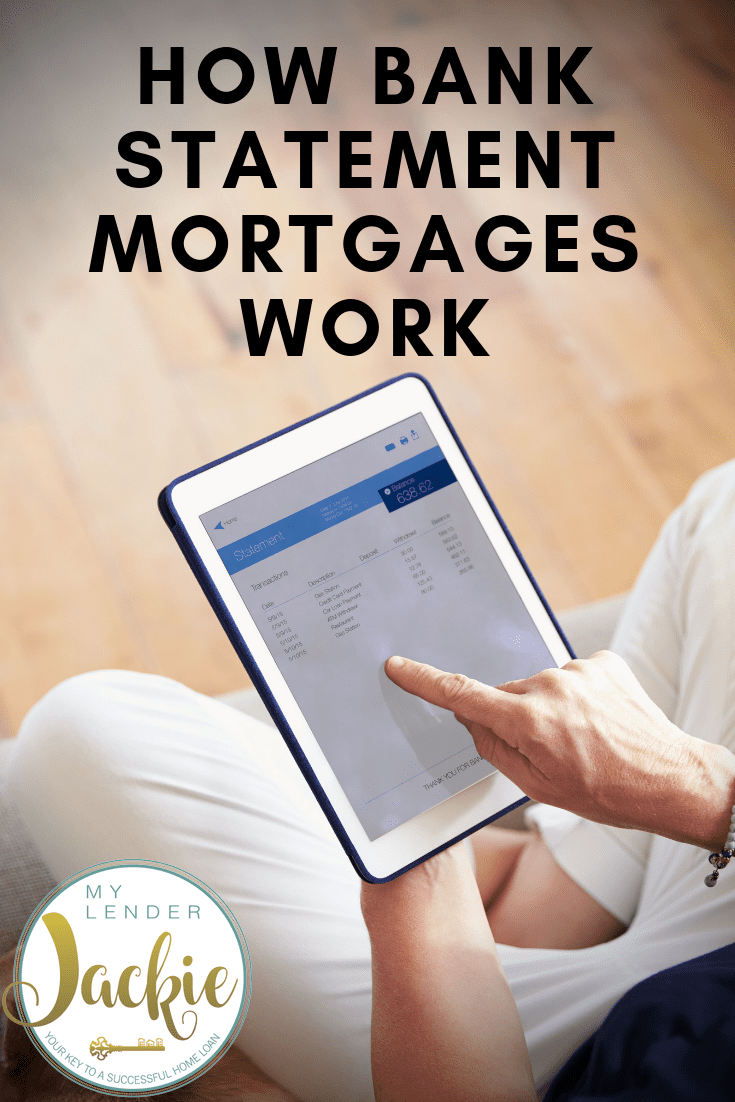For self-employed individuals, a bank statement home loan may be the best thing since sliced bread.
Instead of using W-2’s and tax returns, which most loans rely on, a bank statement loan uses the money you deposit into your bank account each month as proof of income.
Here’s how they work:
Bank Statements instead of W-2’s
With a bank statement mortgage, the borrower provides monthly bank statements, instead of their tax returns and W-2s or pay stubs to verify their monthly income. This program is used for self-employed borrowers & 1099 workers, those that own their own business, freelancers, subcontractors or anyone with seasonal or inconsistent income streams or have too many tax deductions on their tax returns or haven’t filed their returns yet.
Why Bank Statements?
Borrowers may use this program, because they may not be able to or want to provide the documents required to qualify for a traditional mortgage. Applicants who do not receive a regular paycheck but who earn a sufficient income are good candidates for the program. Most bank statement mortgage programs do not require tax returns which is appealing to many borrowers. In short, if you are self-employed, run a business, experience fluctuations in income or want to qualify for a mortgage without providing your tax returns, a bank statement program may be right for you.
Bank Statement Mortgage Lenders
Bank statement mortgages are provided by traditional lenders such as mortgage banks and mortgage brokers (such as myself) as well as private money lenders. This isn’t the only option, either. There may be several loan programs and options better suited to your situation. This is why an experienced mortgage loan officer is so crucial to the home buying process. We find the right loan for your needs, income, and budget.
Bank Statement Mortgage Requirements
Bank statement mortgages are not categorized as qualified mortgages (QM) which means that lenders can apply their own qualification guidelines to applicants instead of applying a uniform set of requirements used by all lenders. Because of this, borrower qualification requirements for bank statement mortgages are more flexible than for standard programs and can vary by lender. This can mean different credit score requirements, down payments amounts or other qualifying factors.
- Lenders typically require 12 months of bank statements and in some cases 24
- Borrowers are Required to Provide Personal Statements, Business Statements and sometimes both
- Borrowers may be asked to provide a Profit and Loss statement for the past 12-24 months.
How is Your Gross Income Calculated for a Bank Statement Mortgage?
Lenders typically calculate an average monthly gross income over the time period reviewed based on account deposits. For example, if you deposit between $8,000 – $12,000 into your bank account every month, your monthly gross income would be calculated by adding up all the normal deposits and dividing by 12 or 24 months.
This can also work if deposits into your bank account are inconsistent or seasonal. We simply average out the amount deposited each month and calculate this over the entire year or two if necessary.
If your bank statements show NSF or overdraft events, be prepared to provide a letter that explains why the NSF or overdraft events occurred and how they were addressed.
What about my credit score?
The lower the score, the higher the interest rate and larger down payment required. Some options allow for scores as low as 500 but the higher the better.
Example:
With a 680+ Rates start in the 4’s and most lenders will do 90% Loan to Value or just 10% Down
With a 500+ Rates would be considerably higher (probably 7-8%) and would require 35% Down Payment
Loan to Value and Debt to Income Ratios
In most cases, the maximum LTV ratio for a bank statement mortgage depends on your credit score. The higher your credit score, the higher the LTV ratio permitted by the lender. All lenders want to make sure you don’t have too much debt and can handle the mortgage payment each month.
Additional Funds and Reserves
Many bank statement loan programs require that you hold three-to-six months of reserves when your mortgage closes. Reserves are usually required for higher-risk mortgage programs or borrowers to provide an extra cushion if an unexpected financial challenge or hardship arises after your loan closes. The reserve requirement is based on total monthly housing expense which includes your mortgage payment, property tax, homeowners insurance, and other applicable expenses.
There are many nuances to the bank statement program and you need a skilled loan officer who has been doing these type of loans and can guide you. Jackie Barikhan has been closing loans for over 20 years and has answers to your questions. Call her today at 949-600-0944 or visit https://www.mylenderjackie.com
Learn More About Bank Statement Loans Now
Jackie Barikhan
Mortgage Banker ~ NMLS#914312
949.600.0944 Fax: 949.284.6885
VA/ FHA/ Conventional/ JUMBO/ Portfolio/ Bank Statement Loans ~ Purchase or Refinance

